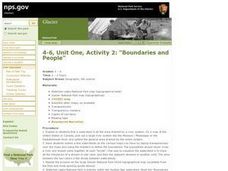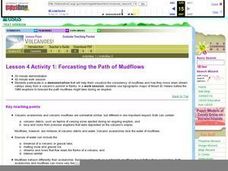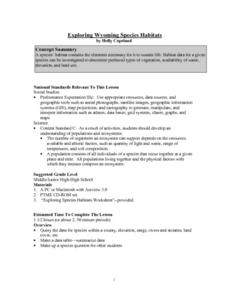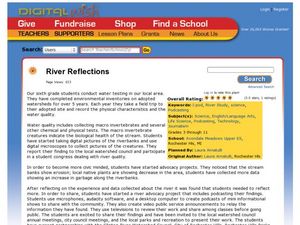Curated OER
Backwards Goes It Does
Students create a three-dimensional model of the Chicago river watershed to determine the flow of the river at its mouth. They use prepared clear gelatin and topographic maps to discover that the building of canals actually reversed the...
Curated OER
Tracking the Salt Front
Students manipulate Hudson River salt front data from October 2004 -
September 2005 to locate the high and low points of the salt front for each month, They determine the range for each month, determine the modal range for each month,...
Michigan Sea Grant
Fish Habitat and Humans
Strict habitat requirements are needed for the survival of fish populations and fish variety in the Great Lakes. Young scientists become experts in the basic needs of fish and understand how survival necessities can vary with different...
Curated OER
Build a Model Watershed
Students build a model land surface. In this building lesson plan, students use the land surface to explore concepts such as water flow, ridges, pools of water, and water quality. They build rivers, streams, land, waterways, and surfaces.
Curated OER
To Protect Your Streams, Protect Your Mountains
Students build and experiment with a watershed to understand the effects of pollution. In this movement of water lesson plan, students work in groups creating rock formations and change the viscosity of the liquids falling down the...
Curated OER
Stream Table
Students build and erode a hillside. In this earth science lesson plan, students build a five inch hillside in a paint pan using sand, soil, and pebbles. They pour water over the hillside to monitor the erosion and how it is...
Curated OER
Red River of the North Flooding 1997
Students describe factors that affect the flow of rivers and explain their relationships. They research the factors involved in flooding events. describe the effects of present and future practices in land use, and river control methods.
Curated OER
Field Exercise: Stream Flow Dynamics & Sedimentation
Students produce a vertical profile of a stream and map and define thalweg, point bar, and cut bank. They measure flow velocity differences across a stream transect and equate flow velocity with size of substrate sediment collected.
Curated OER
River Basin to Reservoirs: A Profile of the Kansas Republican River Basin and Reservoirs
Students examine the role the river played in the settlement of towns in the basin. Student groups prepare an oral presentation on Milford Lake, Tuttle Creek Lake or Perry Lake.
Curated OER
Exploring Our Watershed System
Students examine how watershed systems are made up, and visit the Susquehanna watershed system and map out the system. They evaluate the order of watercourses in their area.
Curated OER
"Tri-County" Project--Water Cycle
Students analyze the parts of the water cycle through research and experimentation. Particular attention is paid to the processes of evaporation and condensation.
Curated OER
Sand Shakes & Mud Pies: Investigating Sediment
Take a field trip to a location where water and land meet to study patterns of sediment organization in wet habitats: river or ocean beaches, sand dunes, tidal marshes, the edge of a pond, or a woodland stream. Small groups collect pairs...
Curated OER
Sand Travels
Students examine how sand is formed by erosion and that it can be moved by streams, rivers, and ocean currents in this unit of lessons. They study waves and currents, and structures that change how sand moves by creating story charts,...
Curated OER
Air Pollution: What's the Solution?
In this air pollution worksheet, students simulate acid rain falling on soil and determine the pH of the soil after spraying it with an acidic solution. They measure the pH of water sprayed with an acidic solution to represent the...
Curated OER
Boundaries and People
Pupils map watersheds to find their boundaries. For this watershed activity students map and then give their "watershed address." Pupils show the trail from stream, larger stream to oceans. Students describe the...
Curated OER
Forcasting the Path of Mudflows
Students visualize consistency of mudflows and how they move down stream valleys away from a volcano's summit. They use topographic maps of Mount St. Helens before the 1980 eruptions to forecast the path mudflows might take during an...
Curated OER
Exploring Wyoming Species Habitats
Middle schoolers are introduced to the concept of species habitats and ranges. They introduced to ArcView GIS as a tool for mapping. Pupils use query data for species withina county, elevation, range, rivers and streams, land cover, and...
University of Southern California
Wave Erosion Lab
Using a stream table, erosion enthusiasts examine how the density of sediment and how the slope of land contribute to the amount moved by waves. You will not be able to use this entire resource as is; there are teachers' names and...
Curated OER
Michigan Quarter Reverse: A Coin Out of Water
Learners examine the Michigan quarter reverse and differentiate between bodies of water. On copies of the quarter reverse, they color the land green and the water blue. After observing photos of water bodies, they complete a worksheet...
Curated OER
River Reflections
Sixth graders create podcasts and video public service announcements. In this environmental advocacy lesson, 6th graders study the local watershed and become advocates for their local environment. In the process, they create podcasts and...
Curated OER
Jump the River
Students practice the skills of jumping and landing while emphasizing swinging the arms when jumping, and landing in a balanced position without falling.
Mr. E. Science
Erosion and Deposition
Get an in-depth look into erosion and deposition with a 23-slide presentation that details how gravity, water, waves, wind, and glaciers cause changes to the Earth's surface. Each slide consists of detailed images equipped with labels,...
Curated OER
The Earth's BIG Features
Your students will enjoy the vivid pictures and interesting facts about world geography, in this presentation. Depicted are several major geographical features found around the world and a description of each.
Curated OER
Benthic Macroinvertebrates
Students survey and describe a stream ecosystem. They sample the benthic macroinvertebrate populations of a given stream and determine community structure through the use of the Chandler Index and a species diversity index.
Other popular searches
- Streams and Rivers
- Create Rivers and Streams
- Rivers and Streams Fl
- Rivers and Streams Lab
- Rivers and Streams Biomes
- Streams Rivers
- Rivers and Streams Bio Mes

























